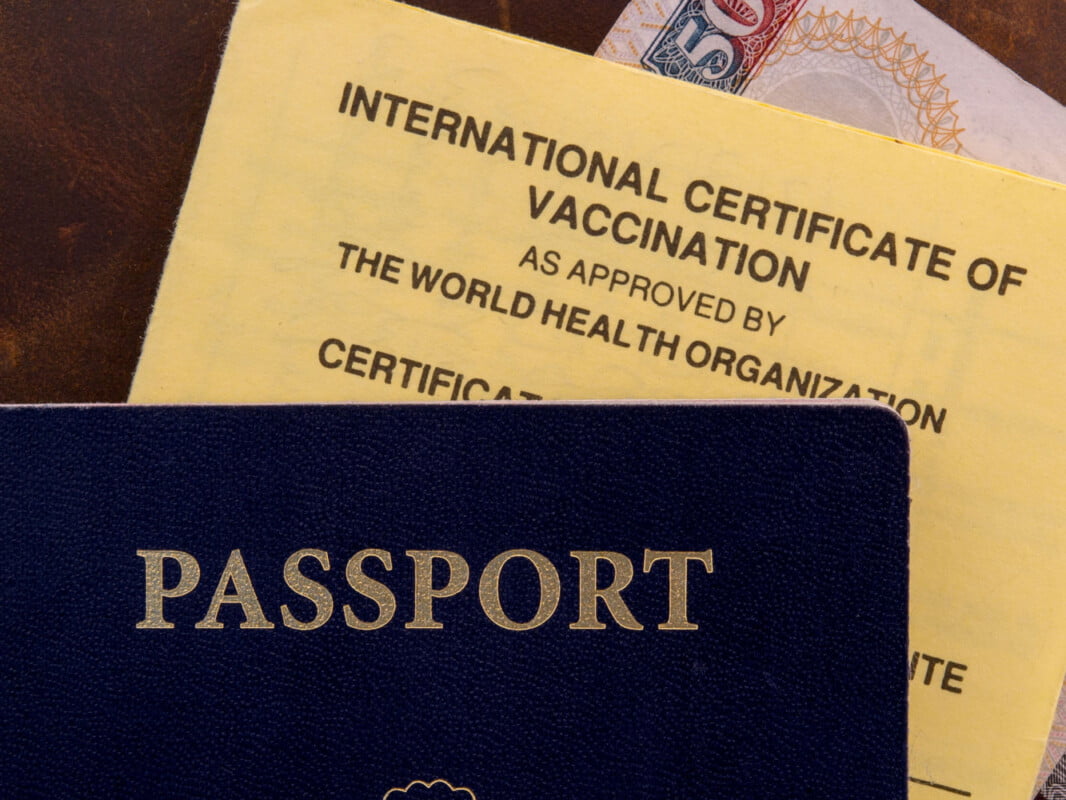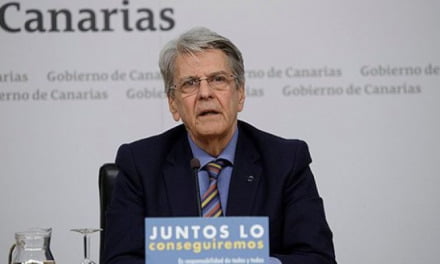The Canary Islands are evaluating the implementation of a COVID-19 vaccination passport in their efforts to relaunch the ailing Islands tourism sector. The Regional Ministry of Tourism, Trade and Industry, headed up by Yaiza Castilla, has reportedly submitted an official query to the Health department to determine the viability of such an initiative.
There is said to be two major overarching considerations in such a project, one is the clear boost it could give to a faltering economy, suffering double the rate of losses of most other regions in Spain and this type of initiative could provide the necessary lifting of spirits needed for the Archipelago’s hotels and hospitality industries, so greatly damaged as the various pandemic restrictions have made these businesses impossible to maintain. Secondly, however, the application of a “COVID-19 vaccination passport” scheme raises serious doubts along with various scientific and ethical questions as to the implementation and standards that would have to be applied to make it work.
Reyes Maroto, Minister of Industry, Commerce and Tourism for the central Government of Spain, has made clear the intentions from Madrid. “We are working to have common vaccination passports within the scope of the European Commission. With the Organisation for Economic Cooperation and Development (OECD) we are also working on initiatives to guarantee safe travel”. The minister spoke again this Monday saying “As we move forward, we will give more information about the groups to which it will be applied, not only to those vaccinated, but also to be able to incorporate this vaccination certificate for mobility of other groups.”
The Balearic Islands has offered itself as a “test” to study this new electronic COVID-19 vaccination passport. Madeira has announced the creation of a green corridor for those who have been vaccinated and those who have recovered from the disease. And the Canary Islands, according to statements made by Regional President Ángel Víctor Torres, in an interview with the newspaper El Mundo, has put the project on the table. “It is necessary to find mechanisms so that those who are vaccinated can travel. We must agree on a global level so that we do not waste time. That there begins to be mobility to enjoy tourism is key ”, insists Torres.
 Sources within the regional government consulted by CanariasAhora have assured them that there is still some uncertainty on this issue and so it is in the embryonic phase. It is known that vaccines significantly reduce the possibility of suffering the most serious symptoms of the disease (in fact, on the Islands hospitalisations of those over 80 years of age, due to COVID-19, have begun to drastically decrease). But it is still too early to conclude that they also prevent contagion. In other words, given the lack of studies and the short time that has passed since the start of the mass vaccination roll out, there is no certainty that immunised people are prevented from transmitting the virus. So prudence is demanded when it comes to any sort of COVID-19 vaccination passport. “This is something recent, and it would not be a panacea [cure-all] either. While it is seen as a desirable measure, the Health Department has not yet formed an opinion. Furthermore, the ideal would be for the European Union to establish a common criterion ” added those sources.
Sources within the regional government consulted by CanariasAhora have assured them that there is still some uncertainty on this issue and so it is in the embryonic phase. It is known that vaccines significantly reduce the possibility of suffering the most serious symptoms of the disease (in fact, on the Islands hospitalisations of those over 80 years of age, due to COVID-19, have begun to drastically decrease). But it is still too early to conclude that they also prevent contagion. In other words, given the lack of studies and the short time that has passed since the start of the mass vaccination roll out, there is no certainty that immunised people are prevented from transmitting the virus. So prudence is demanded when it comes to any sort of COVID-19 vaccination passport. “This is something recent, and it would not be a panacea [cure-all] either. While it is seen as a desirable measure, the Health Department has not yet formed an opinion. Furthermore, the ideal would be for the European Union to establish a common criterion ” added those sources.
The FEHT tourism association president, José María Mañaricúa, of the Federation of Hospitality and Tourism Entrepreneurs of Las Palmas, says that he believes that “the only certainty” that will allow us to reactivate tourism is to achieve group immunity. And that a vaccination passport would only be effective if it was agreed upon by the EU and the Member States. “If Brussels makes a joint decision, it will have value. If not, it will fall on deaf ears again”.
 Mañaricúa points out that there is a the lack of control with respect to border restrictions and the regulation of diagnostic tests. The European Union has positioned itself on several occasions with regard to taking protective measures against the virus. But when it has, it has been in the form of a recommendation, without insisting on a decisions from the Twenty-seven member states. So, thus far, we see that a year since the pandemic broke out, each country decrees, according to its own criteria, whether or not a PCR is necessary to enter (even requiring, in the case of the United Kingdom, up to three negative tests), and that each government draws up its own blacklists. This, in Mañaricúa’s opinion, would not make sense with the vaccination passport. “The safe corridors thing didn’t work out. Then came the PCR. We have been misled several times. If the European Union makes a joint decision for everyone, we would welcome this proposal. But so far, we don’t know what will happen” he adds.
Mañaricúa points out that there is a the lack of control with respect to border restrictions and the regulation of diagnostic tests. The European Union has positioned itself on several occasions with regard to taking protective measures against the virus. But when it has, it has been in the form of a recommendation, without insisting on a decisions from the Twenty-seven member states. So, thus far, we see that a year since the pandemic broke out, each country decrees, according to its own criteria, whether or not a PCR is necessary to enter (even requiring, in the case of the United Kingdom, up to three negative tests), and that each government draws up its own blacklists. This, in Mañaricúa’s opinion, would not make sense with the vaccination passport. “The safe corridors thing didn’t work out. Then came the PCR. We have been misled several times. If the European Union makes a joint decision for everyone, we would welcome this proposal. But so far, we don’t know what will happen” he adds.
Several countries have not waited and are already closing bilateral agreements to speed up the mobility of vaccinated people. Greece and Cyprus, for example, have announced that they will allow citizens of Israel with vaccination certificates (their version of the COVID-19 vaccination passport, the “green pass,” as they have called it), to travel between countries without hindrance in an attempt to normalise pandemic tourism. Spain is apparently open to similar deals: “The debate is very young and these corridors will not come into force for a couple of months. We want to exploit all possibilities, but we do not rule out anything. Our emphasis is on broad multilateral agreements, for which we have the support of Israel, Denmark, Sweden and Iceland ”, say sources from the Spanish Foreign Ministry, talking to elDiario.es.
Now that the subject has once again been broached, there are doubts and expert voices both for and against this idea. The head of the Canary Islands Epidemiology and Prevention section of the General Directorate of Public Health, along with the president of the Spanish Association for Vaccination, Amós García, does not yet fully back the idea, offering three reasons: we do not know if the vaccine prevents infection and therefore cuts the transmission of the disease; the vaccine is not mandatory, so how are we going to force someone to get it?; and only those individuals from rich countries have sufficient access to doses of the vaccine, so “we would be creating another gap between rich states and poor states.” Furthermore, minors, who have not been tested in clinical trials, would also be excluded. “Professionally, I don’t understand it,” sums up García when assessing the scale of the task.
María del Carmen de la Fuente Hontañón, vice president of the Spanish Association of Bioethics and Medical Ethics, shares this point of view, although above all she asks for prudence and demands to know the full nature of the epidemic before accelerating anything. “It is important to remember that not all people respond the same to this virus. A passport like this does not capture the current state of science. We do not have instruments to understand the contagion capacity of a person when they contract COVID-19. I am in favor of a PCR before entering countries, but not of a lifetime accreditation”.
 On February 5, the World Health Organization made public its provisional position, placing itself against the idea of COVID-19 vaccination passport and quoting various scientific, health, ethical and legal reasons. The WHO pointed out that the efficacy of vaccines continues to be surrounded by “unknowns”: if it limits transmission, if it is effective against new variants, the duration of immunity, etc. The recommendations, they point out, will be made as the vaccination campaign progresses. “The reality is multifaceted. You have to be very cautious and not at all simplistic. It is essential to know how each one is doing and the immune status of each patient, because this virus varies a lot, “added Fuente.
On February 5, the World Health Organization made public its provisional position, placing itself against the idea of COVID-19 vaccination passport and quoting various scientific, health, ethical and legal reasons. The WHO pointed out that the efficacy of vaccines continues to be surrounded by “unknowns”: if it limits transmission, if it is effective against new variants, the duration of immunity, etc. The recommendations, they point out, will be made as the vaccination campaign progresses. “The reality is multifaceted. You have to be very cautious and not at all simplistic. It is essential to know how each one is doing and the immune status of each patient, because this virus varies a lot, “added Fuente.
The European Center for Disease Prevention and Control (ECDC) also distrusts the “insufficient evidence on the efficacy of vaccines in reducing transmission” of the virus. Although they do support vaccination certificates that document who has been immunised, when and with what vaccine, but exclusively for “medical purposes.”
On the ethical side, the WHO notes that there is limited access to vaccines throughout the world, mainly in developing countries. More than 90% of the countries that are launching vaccination against the coronavirus are wealthy. “In the current context, introducing this requirement has the potential to hamper equitable global access to a limited supply of vaccines and is unlikely to maximize the benefits of vaccination for individual societies and overall global health,” the WHO says.
It is also not entirely clear whether state restrictions on individual freedoms should be imposed. At least that is the debate raised by the Public Law professors, Íñigo de Miguel Beirán and Jon Rueda, of the University of the Basque Country, in an article published in the BMJ Journal of Medical Ethics entitled Immunity passports: fundamental rights and public health hazards, who advocate the adopting of perspectives from the point of view of the immunised. Arguing that while “the possibility that immunological passports may appear to discriminate against those who do not possess them, the opposite viewpoint of immune people is underdeveloped. We argue that if a person has been tested positive for and recovered from COVID-19, becoming immune to it, she cannot be considered a hazard to public health and, therefore, the curtailment of her fundamental rights (eg, the right to freedom of movement) is not legitimate.”
Germany’s Ethical Council, which includes experts in Law, Medicine and Philosophy, believes that it would be “unacceptable” to withdraw protection measures from a few because “the possibility cannot be excluded with sufficient certainty” that inoculated people continue to spread the virus. A study from Israel, where vaccination has already reached more than three million citizens, indicates that the Pfizer BioNTech vaccine stops transmission by up to 89.4%. Of course, more evidence is still needed, according to Zoe McLaren, associate professor at the School of Public Policy at the University of Maryland, United States, speaking to Bloomberg .
Still, The Economist, at the end of January published that more than two-thirds of British people would be willing to approve a vaccination passport. Though as CanariasAhora points out, this is a perspective from a country where tourism is not as directly important to the economy as it is in the Canary Islands, where four out of ten jobs are directly related to the sector and whose activity accounts for 35% of Gross Domestic Product (GDP).
For now, the jury is out on whether The Canary Islands will be able to spearhead any sort of Vaccine Passport arrangements, but there are clearly a lot of people trying to figure out how such a scheme might work across European Borders and for that matter throughout the world, effectively, ethically and safely.
















No to vaccine passports. If you do we will holiday in own country until the day (when tourism is still not returning and you lift those requirements).
You would be missing out on millions of healthy people who want to come but will choose not to. PCR test also put many people off due to financial implications as well as no one answers the question, if they fail a PCR test is the holiday (flights/hotels) refunded? I won’t book if there is a chance as a healthy person, I will miss out due to floored PCR test and lose money. Probably best to stay closed for another year.